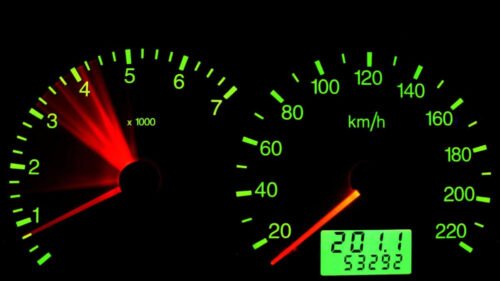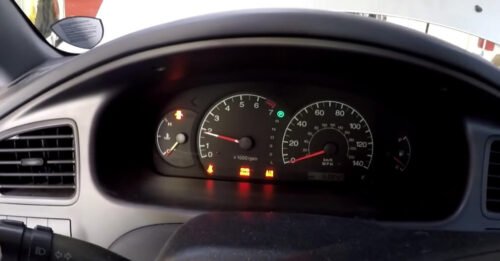It is a major issue of engine failure when a vehicle is running on its own in a stationary or driving mode and could cause collisions or accidents.
Why is your car revving in the park? In this article, we will discuss seven possible reasons for the car’s sudden revving.
This will help you better understand the problem and figure out how to fix it.
Table Of Contents
Why Is My Car Revving In Park? – 7 Main Factors

There are seven major causes of your car revving in the park.
Some of them could be a dusty airflow sensor, a malfunctioning throttle sensor, an erroneous O2 sensor, a leak in the vacuum and a jammed EGR valve, or brittle wiring and malfunctioning computers.
However, before we understand the causes, let’s look at what exactly “revving” is. “Revving” is a slang word used to describe the process of accelerating or increasing car speed.
A sudden vehicle revving on its own in a park could become a fatal issue for the engine if left unchecked.
The issue of idle is usually reduced to the condition of the internal engines that aid in maintaining the vehicle’s constant speed. This is evident in the common signs like the sound of a thumping or the car jerking.
Here are some of the main reasons that contribute to this issue:
Dirty Mass Air Flow Sensor
The dusty sensors for mass airflow is a prominent cause for the issue of revving.
The sensor, which is attached to the automobile engine is designed to detect the air that is flowing through the motor’s mechanism via the throttle component.
The information is then sent to the analysis system. It then uses computer-generated algorithms to calculate the amount of fuel required for the proper production of air into the engine’s cylinders.
The MAF sensor is susceptible to becoming filthy and blocked with debris and dust with time. The accumulation of filth can cause damage to the sensor’s mass airflow and therefore inaccurate air intake information is likely to show up.
It is a good idea to make use of specially designed cleaning products, like CRC spray to clean the MAF sensor, restoring the ability to read airflow.
It is recommended that you also select one or two cleansing tools that do not leave behind any film and can cause great destruction to the sensor.
Sticking Throttle Body
An unclean engine’s throttle is a further reason behind the question: why is my engine revving when I park? The purpose of this device is to regulate the amount of fuel that is used to power the engine.
It works by opening and closing its valve to let the flow of air through the motor.
In the direction of the MAF sensor, the throttle opens the valve to allow only a tiny amount of air or the maximum amount of airflow into inside the MAF mechanism.
Similar to that of the sensor for airflow mass this sensor may be dirty due to the accumulation of crud as time passes.
In the end, the body ceases to perform closing and opening functions in a normal manner and is followed by a rapid revving.
The great thing is that you just need to clean your throttle valve to ensure that air is free to move into the engines of your vehicle. This is a straightforward guide for you to follow:
- Get ready with the essential cleaning equipment like clamps an electric ratchet scrubby, a torque wrench along with an inspection lens. Be sure to wear gloves and glasses because you might use certain chemicals in the process.
- Connect the electrical plug to ensure your protection
- Take off the boot and four bolts that attach to the body of the throttle
- Make sure to soak the throttle upside-down in the solution of chemical to get the dust and dirt off.
- It is recommended to place it in a cool, well-ventilated place to dry.
- The throttle should be put back into the system of your vehicle. Have fun!
Bad Oxygen Or O2 Sensor
A downgraded O2 sensor also is responsible. It is also responsible for the O2 sensor typically inside the catalytic converter is responsible for determining the amount of air that is released coming from your exhaust pipe.
After that, it will transmit the information to the central computer for analysis purposes The computer will then alter the fuel or air ratio to ensure that the engine is functioning effectively.
After a few minutes, water droplets in air moving over the oxygen sensor will be likely to build up carbon deposits, which will result in the phenomenon of rust.
In the end, it can no longer calculate the air outflow and that is the reason your engine will rev up when in the park.
You can determine if the oxygen sensor is damaged or not by looking at the engine light or by using the OBD2 scanner to look up the engine code.
The best solution is to buy a brand-new O2 sensor. This could cost less than a hundred dollars.
Vacuum Leak
A leak in the vacuum is a possible solution for the query: What is the reason my vehicle roars at a high rate at the end of the road? Every engine takes in the air via an air vacuum before compressing it into energy for the wheels.
This vacuum is utilized to power various systems underneath the hood, like brakes, EVAP, or EGR.
A vacuum is a plethora of lines since different systems are linked to one engine. The hoses may get damaged and crack as time passes.
If this happens there is a certain amount of air will escape through the cracked intake hoses, causing discord between the real air ratio and the MAF sensor calculates.
It is possible to purchase a brand-new vacuum hose that is not expensive. However, finding the line responsible for the leakage of air is an actual problem.
In this scenario, you should conduct the smoke test on each vacuum hose to detect any changes in the idle speed.
Malfunctioning EGR Valve
The list of causes is a result of a plugged Exhaust gas Recirculation valve. The valve was created to regulate the emissions of exhaust gases that come from the engine pipe, which protects the environment.
However, one of the major drawbacks to this method is the fact that the accumulation of carbon will probably occur after a brief period of use.
Its function can be disrupted as demonstrated by the ineffective closing and opening functions. As a result the vehicle may and out of parking.
It is a good thing that you can get and buy the components from the exhaust gas recirculation valve. It is also easy to replace it and can be accomplished by anyone who is not a professional mechanic.
Frayed Wiring
In some instances it is possible that the revving issue cannot be attributed to a sensor or a throttle or vacuum line, instead, it is due to the drive-by cable system, which acts as a data transfer intermediary to the car’s computer.
If your vehicle hasn’t been properly repaired and maintained, the electrical wires could corrode, which causes them to fray.
The data sent to the computer system at the base could be inaccurate and inconsistent.
If you’re having issues in getting your vehicle revving by itself in the park make sure you check the electrical connection just within the timeframe you need it.
This can set the stage for further wear and damage shortly. If not, it’s strongly suggested to test an entirely new set of wires if further issues resulting from the previous wiring system arise.
Faulty Car Computer
In the end, a malfunctioning computer could be the cause of the car’s revving when you park. Certain famous brands, such as PCM, ECU, or ECM are often called engine computers.
Although they have different origins, each has the same goal to interpret information gathered from various systems to help keep the engine running efficiently.
If an issue with the computer occurs, it is unable to analyze, summarize, and continue to convert data into useful data.
So, your car could be unable to run and may rev upwards and downwards since it is not under control.
Like other issues that computers face, fixing them isn’t an easy task. Parts are not always available and the repair price is far beyond the budget of many.
Important Notes

- This list isn’t exhaustive. There are many other factors to explain the reason your vehicle is roaring when you park it.
- The throttle body in the car as well as the associated sensors are often the cause of this problem. Make sure to check these parts of your car first, to avoid time and energy.
- An engine that is revving by itself in a park can be dangerous as it could cause your vehicle to abruptly increase its speed. Crashes or accidents on the road could follow.
- Be cautious when driving your possibly out-of-order vehicle for the safety of yourself and others. Take your time and pay attention to the roadway.
- If you discover that something is wrong with your vehicle and you discover the problem, fix it quickly by examining the car’s engines and systems at your home. It is recommended that you make sure that your rear-wheel vehicle is taken to the workshop at the service center in case it’s unable to operate.
Conclusion
All the necessary information on revving problems is available in this informative article.
After you have read our post We hope that you identify the exact issue with your vehicle and be able to answer the question: Why is my car revving in park?
If you find this guide helpful, please pass it to your family members, acquaintances, and others to help us maintain our website.
We invite you to follow us on social media to find more trustworthy sources. Thank for taking the time to read!
Read Also:
What Does Check Fuel Fill Inlet Means?